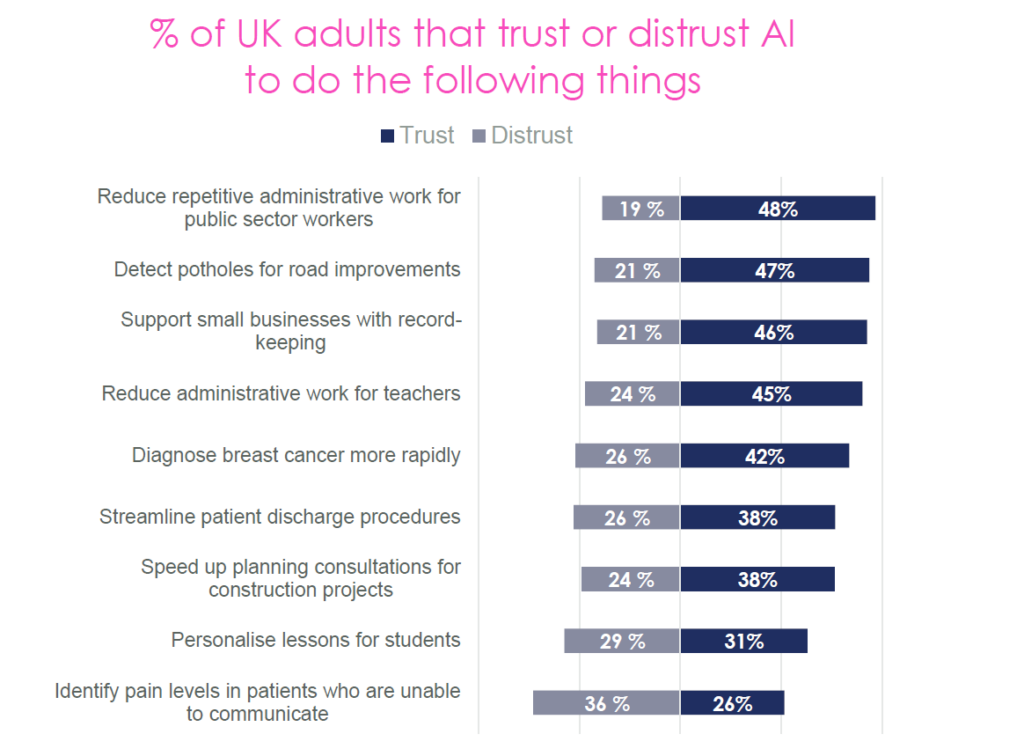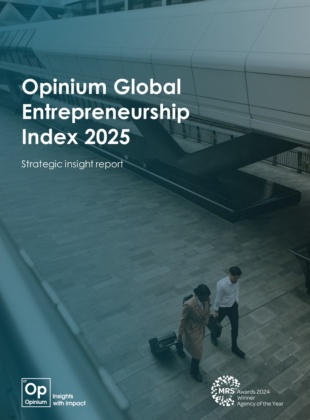Public Attitudes to the AI Opportunities Action Plan

UK public divided on government’s AI Opportunities Action Plan
The UK government recently unveiled its ‘AI Opportunities Action Plan’, a new initiative aimed at accelerating AI adoption across the country which involves “ramping up AI adoption across the UK with the aim to boost economic growth, provide jobs for the future and improve people’s everyday lives”.
A key aspect of the plan involves expanding AI use within the public sector, from local councils to national government departments. This means deploying AI-driven technologies, such as facial recognition and predictive algorithms, to improve public services. However, public opinion is divided with three in ten (29%) supporting this idea and a similar proportion (34%) opposing it. Younger generations (18-34) are the most supportive of AI in the public sector whereas older generations (65+) remain sceptical, with support levels at 37% and 23%, respectively.
As the government pushes forward with its AI ambitions, public confidence in AI’s role across key sectors remains a mixed bag too, with support largely dependent on the specific tasks AI is set to perform. The public is most comfortable with AI tackling repetitive administrative work (48% trust AI to do this), detecting potholes for road repairs (47% trust AI to do this), and assisting small businesses with record-keeping (46% trust AI to do this). Surprisingly, trust in AI diagnosing breast cancer as quickly as possible is nearly equal to trust in less risky tasks like AI streamlining patient discharge processes and expediting planning consultations for construction projects (42% compared to 38% for both respectively). Yet, despite this trust in AI-driven medical diagnostics, UK adults are least likely to trust AI to identify pain levels in patients who cannot communicate (26%).
Education is another sector where trust in AI wavers. While nearly half (45%) of UK adults support AI reducing teachers’ administrative workloads, trust drops (to 31%) when it comes to AI planning lessons for students, with nearly as many (29%) distrusting AI to take on this role.
Among those distrusting in AI’s role in public services, trust hinges on proof, protections, and transparency. The public want hard evidence that AI can perform these tasks well as, if not better than, humans with two fifths (41%) citing proven accuracy and reliability would increase their trust in AI to do these things. Strong regulations and accountability (30%) are also crucial. An equal proportion would need reassurance that it won’t replace people’s jobs. Likewise, data security (28%) and ethical use (26%) are priorities.
Beyond functionality, clarity is key. Nearly a quarter (23%) say they need understandable explanations of AI decisions, while 20% emphasise the importance of privacy safeguards. Bias and fairness also matter, with 19% wanting assurance that AI won’t reinforce inequalities.
Finally, for some, trust depends on credibility. AI systems developed by trusted organisations (14%) and those that meet global standards and certifications (12%) could help win public approval too.

Two-fifths think government should partner with UK companies to roll out the plan, as nearly half distrust international companies to keep UK public data secure
The government has announced that it will partner with specialist AI companies to roll out the ‘AI Opportunities Action Plan.’ Some of these companies are based in the UK, while others are from abroad. This comes as two-fifths (42%) of UK adults believe the government should primarily use UK companies, including 15% who think the government should exclusively use them. Meanwhile, a quarter (23%) prefer a balanced approach, supporting an equal mix of UK and foreign companies. Just 4% believe the government should rely mostly or entirely on foreign companies, while 31% remain unsure.
A preference for UK-based companies may stem from concerns about the handling of UK data abroad. Nearly half (46%) of UK adults’ distrust foreign AI companies to keep public sector data secure, which could include information on healthcare, education, crime and the environment amongst other things. This includes a quarter (24%) who somewhat distrust foreign companies to keep the data secure and a fifth (22%) who completely distrust them. On the other hand, 22% neither trust nor distrust foreign companies, while 14% trust them. One in five (18%) are unsure.
Get in touch with Molly Maclean, Associate Director, for further insights: mollymaclean@opinium.com.





